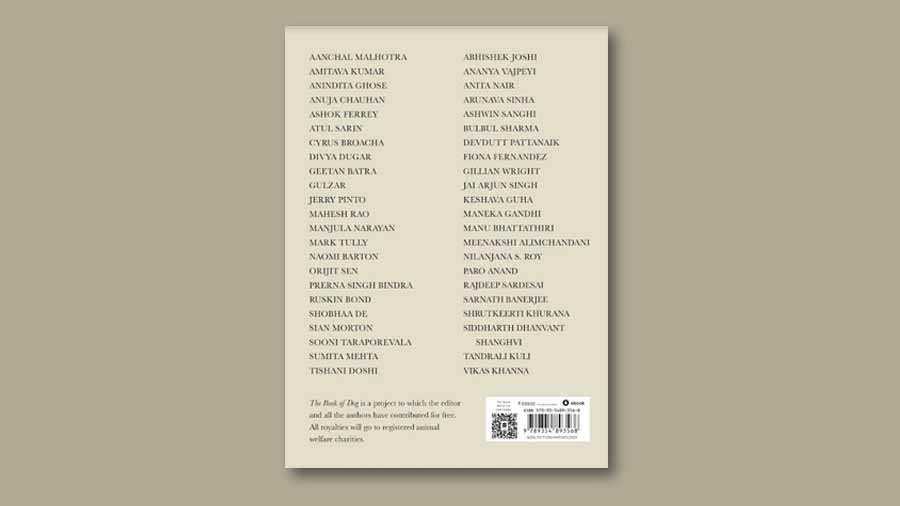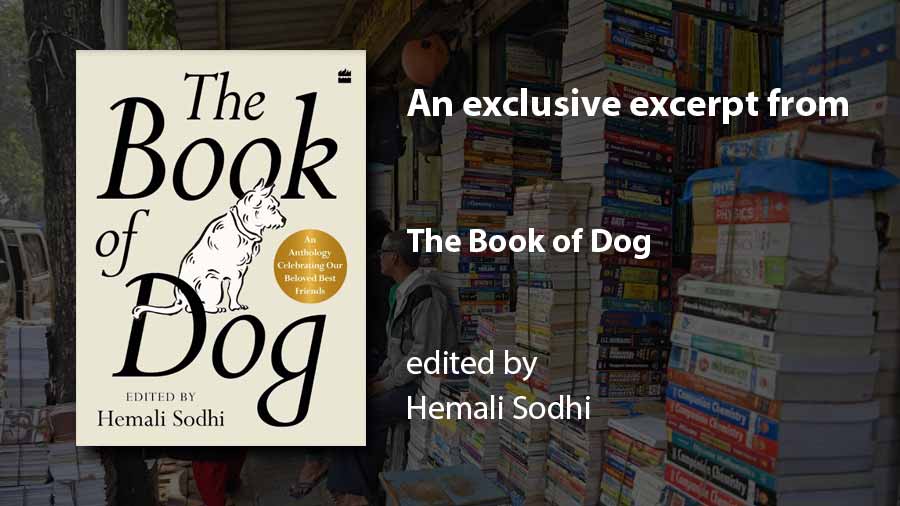In 2020, when Covid hit unexpectedly and the world went into lockdown, the dogs at home were probably the only ones not unhappy with this strange new world—their humans were home and spending time with them for longer periods: it was like hitting the jackpot! And it was the dogs who kept many of us sane and provided comfort—in a world where everything was uncertain, here were our dogs, delighted with this change of circumstance and making the most of it.
And that’s when an idea I had thought about earlier slowly started taking shape—a book of essays and stories on these funny, furry, four-legged companions, an ode and a tribute to all the wonderful dogs from their devoted humans.

Authors who have contributed to this anthology
Dogs bring us together in a way few things can, and bring out the most remarkable side of us. Here’s an essay from The Book of Dog by Mark Tully — a devoted dog lover — reminiscing about all the wonderful dogs in his life.
Friends for Life by Mark Tully
I was born the son of a Calcutta burra sahib, a senior partner of Gillanders Arbuthnot & Co., the largest and oldest of the managing agencies that controlled a vast number of commercial companies.
For the first nine years of my life, I lived in a burra bungalow in Calcutta. It had a big garden which included a tennis court. We children lived a very disciplined life, spending most of our time under the supervision of a strict British nanny. The one time during the day when we used to see our parents was for tea in the garden. This was also the time when Jane, our beloved black-and-white Spaniel, was released from the care of the house help and allowed to join us. In all my life, which has been lived with many different dogs, she was the only one I know who was so human that she drank tea with us. The tea would be served in a saucer to her so that it cooled quickly. The house help would carefully clip her long ears together over her head with a clothes peg to stop them from falling into the saucer. I have tried giving tea to other dogs but sadly they all turned their noses up at it.
In time, Jane was joined by a Dachshund called Noodles, which was the title of a children’s book of the time about a dog. My sister Prue, two years my senior, claimed ownership of Noodles and was very possessive of her. I can’t recall how, but we managed to take Noodles with us on a winter holiday to Puri, travelling by train overnight. Prue and I would take Noodles for walks on the beach where Noodles had a habit of chasing crabs scuttling across the sand. Although the crabs always escaped, I thought this was very cruel, but my sister would hear nothing against her dog. We had an argument and—I remember with some shame—I got so angry that I burst into tears.
When we returned to Britain just at the end of World War II, we lived an unsettled life for some time because my father was looking for a job. Eventually he found one as a director of an engineering company in Manchester and we moved to another burra house in the Cheshire countryside, not far from the city. Immediately, we children, by then six in number, demanded a dog. So a brown-andwhite Spaniel, a male this time, was purchased and we decided he should be called Pip, which was the name of a beloved pony we had in Calcutta. Pip had one feature: he was remarkably unwilling to accept discipline. This used to infuriate my father who was himself a very disciplined man, and a strict disciplinarian. Pip was particularly unruly on picnics when he would disappear, chasing rabbits or following the scent of other animals. When we eventually got him back, my father would give him a sharp slap, but that did no good.
From Pip we graduated to a delightful female Labrador who was described to us as cream-coloured. She was, like all Labradors, immensely sociable and very loving. She was so affectionate, and we loved her so much, that we indulged her other Labrador trait, the tendency to be greedy. As a result she became a stout lady. But when she was still young and slim, my father decided that this time he would have a disciplined dog. He sent poor Bess, as she was called, to the gamekeeper of the Conservative MP, Sir Walter Bromley Davenport, to be trained. Unlike my father, Sir Walter was very much a hunting and shooting man. His gamekeeper trained dogs to retrieve game birds that had been shot. But after a couple of days my father got a phone call from the gamekeeper, demanding he take Bess back, because she was ‘vicious’. To this day I cannot imagine what our darling Bess, the most loving dog ever, might have done to be considered vicious. When father returned home with Bess, who was not the least chastened by her experience; she leapt out of the car, tail wagging ferociously, and ran madly from one member of her welcoming committee to the other, with Father looking on disapprovingly.
When Bess went to her heavenly resting place, a male black Labrador called Diver came into our lives. Like Bess, Diver was very loving and just as gluttonous. But unlike Bess, he was very active too and would disappear sometimes in search of female company. By this time, Father had given up on trying to discipline our dogs and accepted Diver’s absences with resignation. My brother Bob somehow managed to establish ownership of Diver and would not allow him to sleep anywhere except on his bed. Bob used to delight in tickling Diver on his tummy so that one hind leg beat the air frantically as if to scratch. This he called ‘diddling’ Diver. My youngest brother, David, took to shooting but he never tried to train Diver to accompany him on his shoots, remembering Bess’s failure. But Diver did often accompany us on our pony rides through the village. Being very keen on trains, I used to insist that David and our youngest sister, Felicity, ride with me to a bridge over the railway tracks when the crack Manchester–London express, The Mancunian, was due. As the magnificent steam engine hauling the train roared under the bridge at full speed, enveloping us in smoke and covering us in soot, the ponies would buck and neigh and try to bolt in terror, but Diver took it all in his stride and continued nonchalantly, investigating the possibilities of interesting smells.
Diver was the last dog of my childhood. As a young man I went through a period of doglessness because I never lived in a place big enough to have a dog. During my first spell in India working for the BBC, I didn’t keep a dog because I realized that I would not be able to take him or her back to England with me. But on my second spell, which I hoped would last longer, I bought a Labrador as black and as loving as Diver. He had been bred by Field Marshal Sam Manekshaw, we were told, so we called him Bahadur, the Brave. He was even more of a wanderer than Diver. More than once he returned home badly mauled by other dogs competing for the same bitch.
Sadly, my time in India was made much shorter than I had expected by my being expelled from the country during the Emergency. The government had wanted me, and all other foreign correspondents, to sign a document agreeing not to report anything critical of the government. I, like most of my colleagues, refused to do so and was told to leave the country within twenty-four hours. My family followed shortly afterwards, leaving Bahadur in the kindly care of very close friends. When I came back to India eighteen months later, Bahadur almost knocked me over in the enthusiasm of his welcome. He had been beautifully looked after and we resumed our relationship as though there had never been a gap.Since then, I have always had a Labrador to welcome me home after I’ve been away, with the love and loyalty that make a dog such a wonderful friend.
The Book of Dog is published by HarperCollins India. The editor and all the authors have contributed for free. All royalties will go to registered animal welfare charities. The book may be purchased here.
